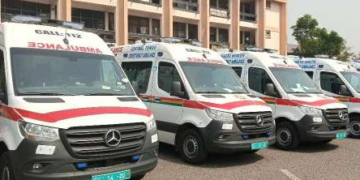The Ministry of Health has taken a significant step towards enhancing healthcare delivery by presenting four ambulances and a water tanker to four key institutions. The beneficiary institutions include the Ghana Armed Forces, the Ghana Police Service (Police Hospital), the Komfo Anokye Teaching Hospital, and the Tamale Teaching Hospital. Additionally, the Tamale Teaching Hospital received a water tanker to address water supply challenges within the facility.
This equipment, valued at $1.56 million, was financed by the Japanese government through the Japan International Cooperation Agency (JICA) in response to a request made by the government of Ghana. Dr. Okoe Boye, expressing gratitude on behalf of the nation, highlighted the longstanding and fruitful relationship between Ghana and Japan.
Over the years, this relationship has been marked by various forms of support, including technical assistance, grant aid, and donations of equipment and commodities. Notable initiatives supported by Japan include the African Health and Well-being Initiative, the Universal Health Coverage (UHC) drive, and the development and launch of the National Health Policy, as well as assistance during Ghana’s COVID-19 response.
In a speech read on behalf of the caretaker Minister of Health, Ursula Owusu-Ekuful, at a brief ceremony in Accra yesterday to hand over the vehicles, the Minister of Health designate, Dr. Bernard Okoe Boye, said, “These pieces of equipment are part of the Japanese government’s support for Ghana’s Primary Health Programme to strengthen Ghana’s health system.”.
Dr. Okoe Boye emphasized that the presentation of this equipment aligns with the ministry’s commitment to achieving universal health coverage by 2030. This initiative reflects the government’s determination to improve access to quality essential healthcare and public health services for all citizens.
Alhaji Hafiz Adam, the Chief Director of the Ministry of Health, reiterated the ministry’s dedication to attaining UHC by 2030, stressing the importance of collaborative efforts from all stakeholders. He emphasized that achieving UHC is a collective responsibility that requires collaboration and partnership among various sectors.
“We, therefore, re-emphasise the importance of all these investments in our universal health goal, especially in improving access to quality health services,” he said.
Major General Raymond Ewusi, Deputy Chief of Staff, Medical, of the Ghana Armed Forces, expressed gratitude on behalf of the beneficiary institutions to the government and JICA for their generous support. He pledged that the equipment would be meticulously maintained to ensure its optimal functionality and impact on healthcare delivery. This commitment underscores the dedication of the beneficiary institutions to utilize the donated resources effectively for the benefit of the communities they serve.

































